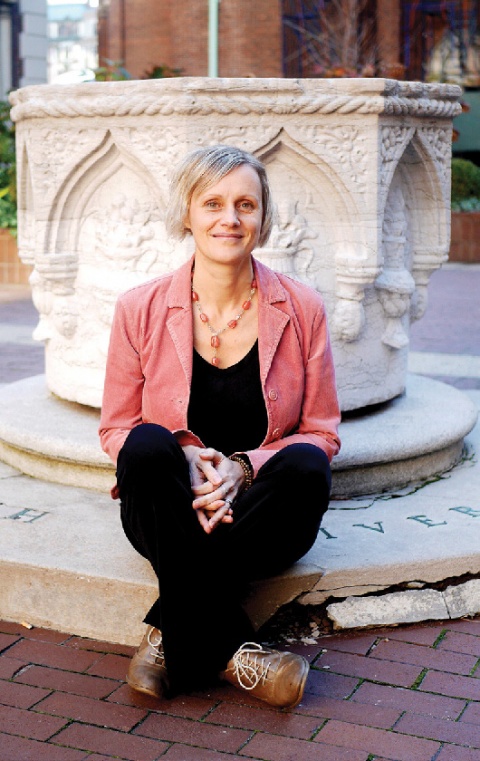Columbia College | Columbia University in the City of New York
The Essentials: Caterina Pizzigoni
When Associate Professor of History Caterina Pizzigoni was studying political science as an undergraduate at the University of Milan in Italy, she took a class in Latin American history that changed her life. Her passion for the subject led her to Nicaragua as a student volunteer, then to the University of London to get an M.A. and eventually to London’s King’s College to get a Ph.D. in Latin American studies. Pizzigoni focused on the archives of Mexico’s indigenous people and researched her dissertation in Mexico City while also learning the Aztec language Nahuatl. Pizzigoni came to Columbia — and New York City — for the first time as an assistant professor in 2006; she received a Columbia Mentoring Initiative Award in 2008 and a Lenfest Distinguished Columbia Faculty Award in 2012. Pizzigoni spoke enthusiastically to CCT about her background, her students and her multilingual household one November afternoon in Fayerweather.

Jill Shomer
She grew up in a small town in the Lombardy region, north of Milan. Her mother had grown up there, and Pizzigoni enjoyed being part of a tight community.
She studied accounting at a local vocational school and planned to work at a bank, but decided instead to continue her education in Milan. She and her younger brother were the first members of their family to go to college.
Her first visit to Latin America came when she was a summer community-development volunteer in Nicaragua. She worked alongside people who were very poor, yet were warm and welcoming. “I got into their lives; they were so generous to let me in,” she says. That first encounter shaped her thoughts about she wanted to do with her life. She was completely taken by the landscape, culture, colors and crafts. “I was won over by everything I saw and wanted to get to know it better,” she says.
After completing her under-graduate thesis about Nicaragua in the 18th century, she realized her passion for history. “I thought it was fascinating to get in touch with people who lived before us, these voices from the past that lay somewhere there, and it’s up to you to rescue them and tell their stories,” she says. Pizzigoni cared especially about Nicaragua’s native people: “I was trying to get to the voices of people we don’t normally hear from, whose stories are not told because they don’t count in the political equation.”
She was studying the cultures of Nicaragua for an M.A. but found her research impeded because that population had mainly oral traditions and didn’t leave written documents. After being accepted to the Ph.D. program at King’s College, she shifted her focus to the colonial archives of Mexico. She went to Mexico City to do research and liked the city so much she stayed for two years, from 1999 to 2001.
She learned Nahuatl during two months of intensive training at Yale. Her grandmother had left her a small inheritance, which allowed her to attend the program taught by James Lockhart, the prominent scholar of colonial Latin America and professor emeritus at UCLA. She showed Lockhart copies of the archival documents she was studying and he was stunned: “Nobody had worked on these testaments before,” she says. Lockhart became a second adviser for her dissertation, which she completed traveling between Mexico City and London.
She was teaching in London when she interviewed at Columbia to be a professor of Latin American colonial history. She had never worked in the United States and so she was happily shocked when she got the job. “I never thought I would end up in a place like this,” she says. “That’s why I feel so committed to teaching.”
She believes strongly in mentorship. “Mentors can change your life. I would never be here if it weren’t for the teachers who helped me,” she says. “I see so much potential in my students; they have so many ideas, who knows who they might turn out to be?”
Her favorite class to teach is “Latin American Civilization I,” a large lecture where she meets students from all paths of College life and is able to transmit some of her subject’s universal lessons. “History is a discipline in which we can learn empathy, points of view of other people and cultures,” she says. “The ‘here and now’ becomes so relative, and that perspective lifts a weight off.”
She met her husband, Gergely Baics, an assistant professor of history and urban studies at Barnard, at a Columbia history department dinner. They have an infant daughter, Emma, who hears Italian, Hungarian, English and Spanish in their home. Pizzigoni is glad her daughter will have an easier time learning languages than she has had as an adult: “My in-laws don’t speak English, and Hungarian has been more difficult to learn than Nahuatl!”
— Jill C. Shomer
Issue Contents
Published three times a year by Columbia College for alumni, students, faculty, parents and friends.
Columbia Alumni Center
622 W. 113th St., MC 4530, 6th Fl.
New York, NY 10025
212-851-7852
cct@columbia.edu
Columbia Alumni Center
622 W. 113th St., MC 4530, 4th Fl.
New York, NY 10025
212-851-7488
ccalumni@columbia.edu

